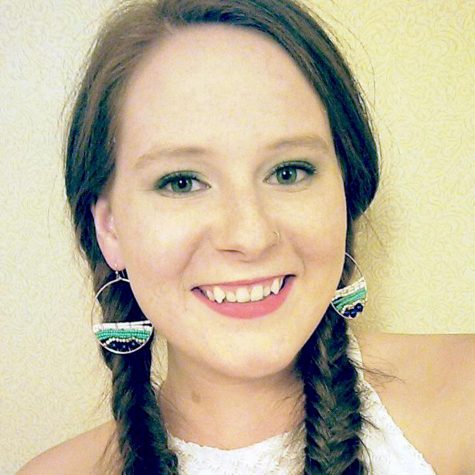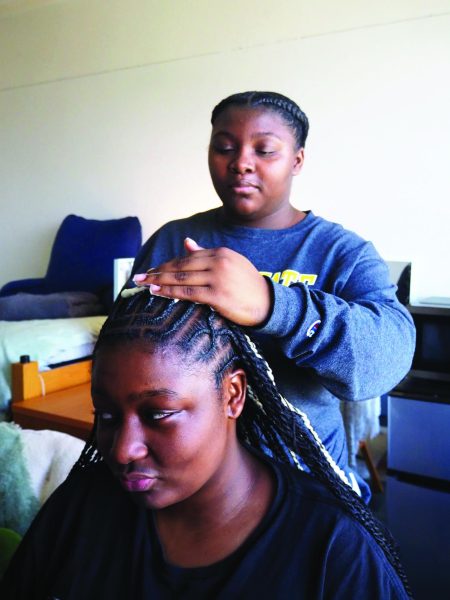Scared and ignored
Sexual assault statistics are misleading as victims are afraid to talk
April 29, 2015
Blinding fear is what keeps them quiet. Fear of retaliation. Fear of their reputation. Fear that nothing will be done.
Actual statistics about sexual assaults on campuses are difficult to find because not everything gets reported. Mainly due to fear. An estimated 16 to 20 percent of undergraduates are sexually assaulted on campuses.
According to the documentary film “The Hunting Ground,” in most cases, university officials rarely do anything for the victim.
A study done by Gallup reported that only 6 percent of college presidents that responded said sexual assault is common on their campus. Either the victims aren’t reporting assaults or the colleges aren’t acknowledging them.
It doesn’t matter which reason. Both indicate a serious and growing problem on college and university campuses around the United States.
Situations like the University of Virginia “rape” that was told by Rolling Stone writer Sabrina Rubin Erdely only worsen the view points on sexual assaults on campuses.
Rolling Stone published an article that told the story of “Jackie” (who is most likely fictitious) who was gang raped by several male members of a fraternity.
The story lacked other sources that could make it more credible. When the police got involved, they couldn’t find any evidence that made the story true.
Besides harming the reputation of Rolling Stone, the scandal has caused some to take a look at the “rape industry.”
Wayne State College counselor Michelle Meyer agrees with Jon Stewart, the social and political commentator on “The Daily Show.”
“In a sea of verifiable assaults, you managed to ‘Where’s Waldo’ the only rape story that not only would fail to get your point across, but set the cause back,” Stewart said.
Cases like this have caused the legitimacy of sexual assault to be mocked. Instead of giving support to victims, sometimes their experiences raise doubts that shouldn’t be raised.
“I think these kind of scandals hurt the cause and hinder the help we can provide to victims to heal because they may not come forward or reach out for help they need,” Meyer said.
Meyer believes rape culture produced in media has changed the way people talk about rape.
“It is a culture that legitimizes the language of rape from: ‘We are raping mother nature’ to ‘I’d tap that,’” Meyer said.
A WSC student, who wished to remain anonymous, spoke out about her experience being sexually harassed and rape culture as a whole.
“I think a lot of people don’t really know the meaning of consent, especially when alcohol is involved,” she said.
This is also tied in with victim blaming.
Victim blaming is when people blame the victim for the assault. The most common “reasons” why offenders say they assaulted someone is because of what the victim was wearing and that they were drunk and “asking for it.”
“Instead of [blaming] the offender, who is in control of their body and urges, we [society] blame the victim who would never wish to have this happen,” she said.
Recently, an unidentified man was photographed at the music festival Coachella wearing a t-shirt that said “Eat Sleep Rape Repeat,” which is a play on the lyrics by Fatboy Slim “Eat Sleep Rave Repeat.”
This photograph has sparked a lot of outrage because it exemplifies rape culture.
Sexual assault doesn’t happen to just one gender. Men can also be victims, but there is an entirely different stigma about it.
Men who are assaulted are told they should have enjoyed it rather than be hurt from it, but this doesn’t negate the fact that it was still assault and should be dealt with legally.
To clear up any confusion, there is a difference between rape and sexual assault. Rape defined by the FBI is “penetration, no matter how slight, of the vagina or anus with any body part or object, or oral penetration by a sex organ of another person, without the consent of the victim.”
Sexual assault defined by the U.S. Department of Justice is “any type of sexual contact or behavior that occurs without the explicit consent of the recipient. Falling under the definition of sexual assault are sexual activities as forced sexual intercourse, forcible sodomy, child molestation, incest, fondling, and attempted rape.”
Rape is sexual assault, but not all sexual assaults mean a victim is raped.
What some are calling into question is the statistic that one in five women are sexually assaulted on college campuses. However, these people confuse sexual assault with rape.
This leaves them incredulous and saying that the statistic is made up and couldn’t possibly be true.
It’s true that the number is an estimate. More women could be experiencing sexual assaults the inverse could be true. The only way an accurate number can be reached is if all victims, male or female, come foreword.
“I feel sexual assault is an under-reported crime,” Meyer said.
Jason Mrsny, security manager at Wayne State College, said there is only one or two reported cases of sexual assault at WSC most years. So far this academic year, one has been reported.
“I can assure you that there are a number of sexual assaults that do not get reported for numerous reasons,” Mrsny said.
The anonymous WSC student was sexually harassed during a movie by a fellow student. She didn’t report the crime but asked the offender to never contact her again. To her, this goes back to the concept of consent and how some people do not seem to understand it.
“I don’t know why he thought it was okay to do that,” she said.
Even if a sexual assault goes unreported legally, victims may still feel the need to reach out to the counseling center for help.
“It’s our job just to help them and to make them feel good again,” Meyer said.
The student did go to the counseling office for help dealing with the trauma she faced. She described a feeling of numbness during the harassment itself which caused her to freeze in the situation rather than try to get away.
“I didn’t want to cause a huge scene in the middle of a movie,” she said.
This a a common feeling that victims develop. Afterwards, she felt guilty for not doing anything to stop the situation.
“I just kept replaying it over and over in my mind, like ‘Did he really just do that to me?’ ‘Yes he did.’ It was pretty traumatic,” she said.
Other resources in Wayne are offered to victims to help them through their trials. The Haven House, located near Quality Foods offers emergency shelter, legal and medical advice and peer support groups.
Providence Medical Center has the Sexual Assault Response Team. This team is trained to gather physical evidence and listen to the experience with sensitivity and compassion. SART is designed to help victims go through this process only once.
“Instead of doing it for the hospital and law enforcement and other entities, they will have just one interview and examination to make that a less intrusive process,” Meyer said.
What happens exactly when someone reports a sexual assault, and what does the school do?
The passage of Title IX in 1972 prohibited sex discrimination in schools. Not only does it help students who have experienced sex discrimination, it also protects students who are victims of sexual assault or harassment.
Every school must have a Title IX coordinator who follows the procedures set by the school if a victim chooses to make a complaint.
Once Candace Timmerman, the coordinator at WSC, receives a report of sexual violence or harassment, she will discuss specifics such as involving law enforcement and what resources are offered to the victim.
Then the coordinator will discuss with the Nebraska State College System General Counsel to see if an investigation will take place.
After the investigation is finished, the vice president or president will issue a statement to the victim, offender and the Title IX coordinator the outcome of the investigation and if disciplinary action will take place.
While Meyer thinks this process is effective, she does have an issue with the fact that the coordinator is also the Director of Human Resources, who is an agent of the college.
“I think that’s possibly a conflict of interest. The Title IX coordinator, I would hope, would be more of an advocate for students and I am not sure that is where the priorities are,” Meyer said.
A year after the offense, the student’s offender walked through the door of one of her classes. As he sat behind her, she decided it was time to tell someone at the college.
She first reported it to her teacher who has accommodated her seating-wise and for any group activities.
“It is really nice to have a teacher who is on my side during this,” she said.
After discussing it with the teacher, she moved on to Matt Weekly, director of residence life. Because there haven’t been any further attempts to harm the student, she couldn’t really take much action legally.
“He [Matt Weekley] told me that he [the offender] is a student and has the same rights as everyone else does,” she said. “I told them more so to let them know what was going on rather than actually do something about it.”
Even though she didn’t pursue the issue legally or through the college, she does strongly encourage others to speak up about any sexual assault or harassment.
Whether students know it or not, Wayne does actively set up programs designed to help prevent sexual assaults.
Campus security has a program called Rape Aggression Defense or RAD, one of three in the state. RAD is a national system that has programs for seniors, men, women and children that teaches self-defense and other information about rape and sexual assaults.
“We had a very good turnout [to the class] this semester. There were two classes available for female staff, students and faculty,” Mrsny said.
Wayne was one of the first schools in Nebraska to get the program about 15 years ago. Security is always trying to change and update information and classes so students can try to prevent a sexual assault from happening.
“It’s been a very successful program,” Mrsny said. “We encourage all young females to take a look at the class.”
Apart from offering these classes, other education opportunities have been made available. A display was set up in Connell Hall that describes how people can help and describes behaviors of sexual assault.
Luckily, the experience, while burned into the student’s memory, doesn’t affect her day-to-day life anymore.
She does have some bad days where she gets down about the situation. However, she has realized that he no longer has any power over her. If confronted with him, she would say she has moved on.
Last night, the Majestic Theater showed “The Hunting Ground.”
A common theme that several students felt was that “the rape was bad but the way we were treated after was worse.”
This is how many students feel after an assault, which only adds to the fact that fewer and fewer students will actually report an assault.
Sigma Alpha Epsilon, a national fraternity, has been labeled as “Sexual Assault Expected.” A former president of the Dartmouth College SAE chapter explains how the fraternity would celebrate the “sexual conquests” of the brothers.
“I feel fortunate that we have this opportunity to bring it to campus,” Meyer said.
Students who have been assaulted are strongly encouraged to take action, because the only way the culture surrounding rape and sexual assault will change is if there is a collective force to end it.









